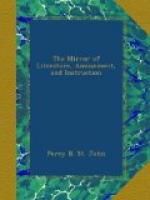For the last five-and-twenty years naturalists in Europe have been striving to obtain the carcass of the impregnated female Ornithorhynchus paradoxus, for the purpose of ascertaining its mode of gestation, but without success; for it is by dissection alone that the hitherto doubtful and disputed point concerning the anomalous and paradoxical manner of bring forth and rearing its young can be satisfactorily demonstrated. This long-sought-for desideratum is at length attained. Through the kindness of his friend, Lieut. the honourable Lauderdale Maule, of the 39th regiment, Dr. Weatherhead has had the bodies of several ornithorynchi transmitted to him from New Holland, in one of which the ova preserved; establishing, along with other curious circumstances ascertained, the extraordinary fact, that this animal, which combines the bird and quadruped together in its outward form, lays eggs and hatches them like the one, and rears and suckles them like the other.—Proc. Zool. Soc.
* * * * *
NOTES OF A READER.
* * * * *
JUNOT AND NAPOLEON.
This soldier of fortune being one day, during the siege of Toulon, at his post at the battery of St. Culottes, an officer of artillery, who had recently come from Paris to direct the operations of the siege, asked from the officer who commanded the post for a young non-commissioned officer who had at once intelligence and boldness. The officer immediately called for Junot; the officer surveyed him with that eye which already began to take the measure of human capacity.
“You will change your dress,” said the commander, “and you will go there to bear this order.” He showed him with his hand a spot at a distance on the same side. The young sergeant blushed up to the eyes; his eyes kindled with fire. “I am not a spy,” said he, “to execute their orders; seek another to bear them.” “Do you refuse to obey?” said the superior officer; “do you know to what punishment you expose yourself in so doing?” “I am ready to obey,” said Junot, “but I will go in my uniform, or not at all.” The commander smiled, and looked at him attentively. “But if you do, they will kill you.” “What does that signify?” said Junot; “you know me little to imagine I would be pained at such an occurrence, and, as for me, it is all one—come, I go as I am; is it not so?” And he set off singing.
After he was gone, the superior officer asked, “What is the name of that young man?” “Junot,” replied the other. The commanding officer then wrote his name in his pocket-book. “He will make his way,” he replied. This judgment was already of decisive importance to Junot, for the reader must readily have divined that the officer of artillery was Napoleon.




